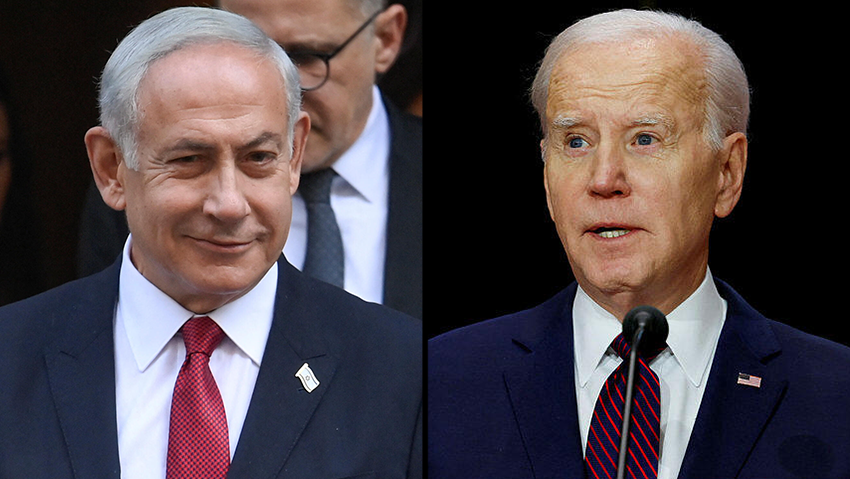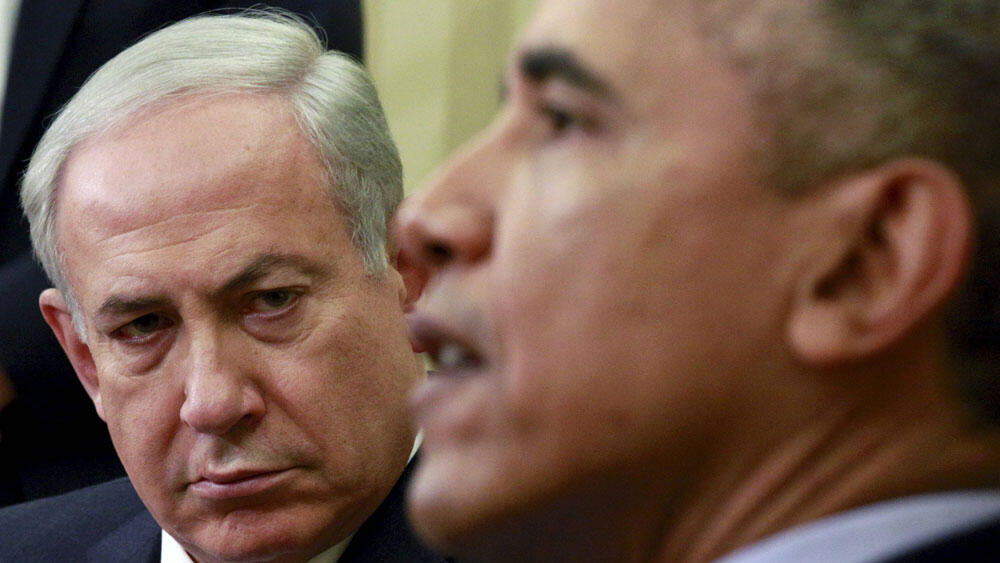President Joe Biden is in a political bind as he crafts a U.S. response to Prime Minister Benjamin Netanyahu defiantly pushing through the first part of a divisive judicial overhaul.
Read more:
Despite Washington’s longtime status as Israel’s top ally and biggest weapons supplier, Biden appears to have few good options.
2 View gallery


President Joe Biden doesn't want to have a public fight with Prime Minister Benjamin Netanyahu
(Photo: Reuters)
Direct and sometimes pointed appeals from Biden and senior aides failed to dissuade Netanyahu and his religious-nationalist coalition from ramming through the Knesset on Monday new curbs on the Israeli Supreme Court that critics in the U.S. and in mass street protests in Israel have called anti-democratic.
The White House, in a terse statement, called the Knesset vote "unfortunate" and urged work toward a broad consensus. But it offered no hint that Netanyahu’s government could face practical consequences, exposing the limits of Biden’s ability to rein in the long-serving right-wing leader.
Biden, having professed his love for Israel during much of his decades-long political career, faces the challenge of pressuring Netanyahu to avoid more weakening of the judiciary while keeping U.S.-Israeli relations from derailing.
"Biden does not want an open fight with Israeli leaders. It's too politically costly," said Aaron David Miller, a former Middle East negotiator under Democratic and Republican administrations. "So he’s stuck ... with a difficult balancing act."
Karin Jean-Pierre: ,Biden and Netanyahu are talking honestly with each other,
(צילום: The White House)
Weighing heavily on Biden is the 2024 presidential election. He and fellow Democrats realize they can ill afford to give Republicans ammunition to paint them as anti-Israel, which could hurt him with independent voters and alienate some Jewish donors.
Republican lawmakers and presidential candidates have quickly accused Biden of meddling in Israel's domestic affairs. They are appealing in part to a large Christian evangelical following, one of Israel's strongest U.S. constituencies.
At the same time, there are widening divisions over Israel within Biden's Democratic Party. A handful of Democratic lawmakers boycotted a speech to Congress last week by President Isaac Herzog, over Israel's treatment of Palestinians.
One main reason for Biden's limited leverage is that he has ruled out any response that would reduce the billions of dollars in annual U.S. military aid to Israel, U.S. officials said.
Biden is also hamstrung by Washington's own security needs, including helping to maintain Israel's military edge against Iran. A threat by some Israeli military reservists opposed to the judicial overhaul to resist reporting for duty caught Washington's attention because it raised questions about Israel's future military readiness.
But Biden may still have some lesser pressure points at his disposal.
One is the administration's work on normalizing relations between Israel and Saudi Arabia, something Netanyahu has sought with little success.
2 View gallery


Benjamin Netanyahu had a fraught relationship with US President Barack Obama
(Photo: Reuters)
"So, will Biden be less committed (to that effort)? We don't know," said David Makovsky of the Washington Institute and a former senior U.S. adviser on Israeli-Palestinian negotiations during the Obama administration.
In addition, the Biden administration last week announced it was opening a review period to decide whether to grant Israelis the coveted privilege of travel without visas to the U.S., a decision that could be complicated by diplomatic
Biden, who has had frosty relations with Netanyahu compared with former President Donald Trump, gave an unsubtle dig to the Israeli leader last week with his lavish Oval Office welcome for Herzog.
Netanyahu’s aides had been pushing for a meeting all year but were rebuffed by the White House because of concerns over Netanyahu's judicial plan and Jewish settlement construction in the occupied West Bank, U.S. officials said.
In a phone call before hosting Herzog, Biden finally invited Netanyahu for an official visit later this year. But U.S. officials have yet to set a date or concur with Israeli statements that they would meet at the White House in September.
One White House official said Biden, having known Netanyahu for decades, can be especially blunt with him in private. Biden used their latest call to again press Netanyahu to slow down the judicial overhaul, but that failed to avert Monday's vote.
Biden has made no secret of his concerns that Netanyahu’s coalition, the most far-right in Israeli history, is risking the independence of the judiciary.
Further complicating matters, Tom Nides ended his posting as ambassador to Israel last week, leaving the U.S. without its most senior diplomat on the ground.
Biden is expected to move cautiously to see whether Netanyahu makes good on a promise to seek agreement with the opposition on further judicial changes by the end of November.
What Biden is likely to avoid is the kind of response that could cause his relationship with Netanyahu to become as antagonistic as between the prime minister and then-President Barack Obama.
Biden, as Obama’s vice president, witnessed first-hand Obama’s fraught dealings with Netanyahu over the 2015 international nuclear deal that Obama spearheaded with Iran and U.S. displeasure with Israeli settlement expansion on occupied land the Palestinians want for a state.
"Biden is not Barack Obama," said Miller, now an analyst at the Carnegie Endowment for International Peace in Washington. "He had a ringside seat to what happens when the U.S. president decides to take on Israel."



